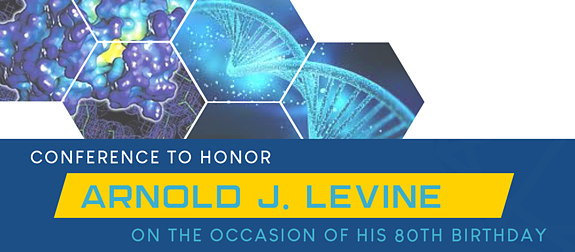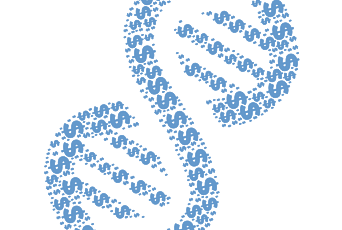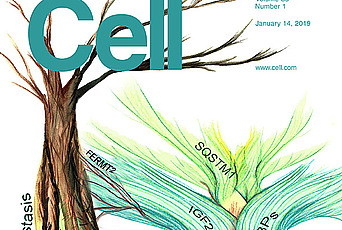Celebrating the Convergence of Discovery, Imagination, and Leadership to Define the Landscape of Systems Biology
Press Contact

Arnold J. Levine, Professor Emeritus in the School of Natural Sciences, was among the first researchers to independently isolate the p53 protein in 1979. A recognized leader in cancer research and mentor to countless young scholars, Levine’s distinguished career has spanned various branches of the biological sciences from virology and immunology to molecular biology and genetics. To commemorate the 40th anniversary of p53 along with Levine’s 80th birthday, the Institute for Advanced Study will host two days of talks on its campus from September 12–13, 2019, to discuss and reflect on the significance of Levine’s work, current efforts in cancer convergence research, and how to inspire the next generation in making the fundamental discoveries of the future.
“Arnie is the most generous scientist I’ve ever met—always willing to share his insights, welcome researchers from all disciplines, and advocate for biology, the Institute, and science in general,” stated Robbert Dijkgraaf, Director and Leon Levy Professor. “We are extremely fortunate to have him as an anchor for the Simons Center, which continues to be guided by his imagination, expertise, and collaborative nature.”
The conference will feature a diverse panel of world-leading experts, representing a variety of fields including molecular biology, genetics, computational biology, oncology, biotechnology, biomedical informatics, and systems biology. The topics to be discussed include the legacy of p53, work within the Simons Center for Systems Biology, and the future of cancer research. The current list of scheduled speakers is as follows:
- Mickey Atwal, Cold Spring Harbor Laboratory
- Chang Chan, Cancer Institute of New Jersey
- Titia de Lange, Rockefeller University
- Robbert Dijkgraaf, Institute for Advanced Study
- Benjamin Greenbaum, Mount Sinai
- Rudolf Jaenisch, Whitehead Institute, Massachusetts Institute of Technology
- Arnold J. Levine, Institute for Advanced Study
- Guillermina Lozano, MD Anderson Cancer Center
- Marta Luksza, Mount Sinai
- Elke Markert, Institute of Cancer Sciences
- Ute Moll, Renaissance School of Medicine
- Moshe Oren, Weizmann Institute of Science
- Raul Rabadan, Columbia University
- Harlan Robins, Adaptive Biotechnologies
- Thomas Shenk, Princeton University
- Robert Weinberg, Whitehead Institute, Massachusetts Institute of Technology
“Arnie’s work as a researcher and a convener of ideas served as the foundation for the Simons Center for Systems Biology—an environment where various fields are united to address fundamental questions in the biological sciences,” stated Benjamin Greenbaum Assistant Professor at the Tisch Cancer Institute at Mount Sinai and a former Long-term Member and current Visitor of the Institute’s Simons Center (2008–13, 17–current). “As a theoretical physicist, the Center provided space to think and a rare opportunity to advance my research in an environment of mutual respect while encountering a diverse range of ideas. The Center remains a hub of interdisciplinary collaboration, removing barriers to creative research.”
Levine’s work has long been characterized by its capacity to create a convergence of new insights. Since its discovery in 1979, p53 has sparked a cascade of research with approximately 50,000 papers generated within the first 30 years. In a 1991 Nature paper, Levine and his collaborators reported that mutation of the p53 gene is the single most common genetic alteration observed in human cancers. Researchers have identified p53 mutations in 100 percent of ovarian cancers, 70–90 percent of lung and colon cancers, and up to 33 percent of breast tumors.
Under normal conditions, p53 functions to suppress inappropriate cell proliferation, activating in response to certain stresses, such as DNA damage, hypoxia, or telomere shortening. The suppressive effects of p53 are commonly achieved through induction of apoptosis (cell destruction), senescence, or cell cycle arrest, which allows for the repair of DNA during the process of cell division. When mutations occur in the p53 gene, damaged cells are more likely to be replicated.
Levine served on the faculty of Princeton University (1968–1979 and 1984–1998), Stony Brook University (1979–1983), and Robert Wood Johnson Medical School (2003–2015). He was President and Chief Executive Officer of the Rockefeller University (1998–2002) as well as Heilbrunn Professor of Cancer Biology and laboratory head until joining the Institute in 2002. Levine is a graduate of Harpur College, State University of New York, and earned his Ph.D. in microbiology from the University of Pennsylvania School of Medicine.
The conference, sponsored by the Institute for Advanced Study, will take place on Thursday and Friday, September 12–13, 2019, on the Institute campus. Registration is required. For press interested in covering the event, please contact Lee Sandberg at lsandberg@ias.edu.
About the Simons Center for Systems Biology
The Institute’s Simons Center for Systems Biology in the School of Natural Sciences conducts research at the interface of molecular biology and the physical sciences. Led by Arnold J. Levine, Professor Emeritus in the School of Natural Sciences, the Center hosts a range of distinguished Members and Visitors annually and fosters original research in the field of systems biology. Recent technologies have generated enormous amounts of hitherto unseen biological and genetic data. The tools of modern physics, mathematics, and computer science enable integration of such data, which will result in leaps of fundamental understanding of evolution and basic molecular biology and will reduce—perhaps by years—the time leading to significant breakthroughs in developing personalized approaches to diagnosis and treatment of cancer, viruses, and other diseases. Researchers at the Center include a diverse group of theoretical physicists, cancer biologists, mathematicians, and computational biologists of extraordinary promise. In 2005, the Center was named the Simons Center for Systems Biology to reflect the generosity of Trustee Emeritus James H. Simons, a former Member in the School of Mathematics, and his wife Marilyn Simons, who provided crucial support for the systems biology program with a charitable grant from the Simons Foundation.
About the Institute
The Institute for Advanced Study is one of the world's foremost centers for theoretical research and intellectual inquiry. Located in Princeton, N.J., the IAS is dedicated to independent study across the sciences and humanities. Founded in 1930 with the motto "Truth and Beauty," the Institute is devoted to advancing the frontiers of knowledge without concern for immediate application. From founding IAS Professor Albert Einstein to the foremost thinkers of today, the IAS enables bold, nonconformist, field-leading research that provides long-term utility and new technologies, leading to innovation and enrichment of society in unexpected ways.
Each year, the Institute welcomes more than 200 of the world's most promising researchers and scholars who are selected and mentored by a permanent Faculty, each of whom are preeminent leaders in their fields. Comprised of four Schools—Historical Studies, Mathematics, Natural Sciences, and Social Science—IAS has produced an astounding record of introducing new understanding and is responsible for undeniable progress across disciplines and generations, from the development of one of the first stored-program computers to the establishment of art history as a discipline in the United States. Among its present and past Faculty and Members are 33 Nobel Laureates, 42 of the 60 Fields Medalists, and 18 of the 20 Abel Prize Laureates, as well as many MacArthur Fellows and Wolf Prize winners.


